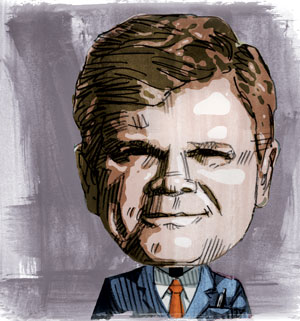George Campbell on eloquence, analogies and how to handle a hostile audience

Illustration by Sam Ward
If you follow this column, you know that I occasionally interview writers of the past. I ask them questions and they speak through their books—no spiritualist required. This month, we’re talking with George Campbell (1719–1796), the Scottish rhetorician and professor of divinity. A major figure in the Scottish Enlightenment, he was an erudite student of persuasion. I sat down recently to interrogate his The Philosophy of Rhetoric (1776). In the following exchange, Campbell uses 18th-century language, so it may take you a moment to adjust to his style.
Garner: You write a great deal about eloquence. How do you define it?
Campbell: Eloquence is the art or talent by which the discourse is adapted to its end. All the ends of speaking are reducible to four: every speech being intended to enlighten the understanding, to please the imagination, to move the passions, or to influence the will.
Garner: Lawyers are commonly trying to influence the minds of judges and juries. Our goal is to persuade. That may involve enlightenment, gratification and even playing on emotions. Right?
Campbell: Although the lawyer may intend to move his audience, he only declares his purpose to convince them. To profess an intention to work upon their passions would be in effect to tell them that he meant to bias them by his art and, consequently, would be to warn them to be on guard against him. Nothing is better founded than the famous aphorism of rhetoricians: The perfection of art consists in concealing art.
Garner: What’s required for this perfection?
Campbell: Simplicity of word choice and precision in arrangement, from which results clarity.
Garner: That’s certainly true. But the law or facts of a case are often far from simple. How can a lawyer efficiently communicate a complex legal argument?
Campbell: The syllogism is the shortest way of communicating principles. If a syllogism be regular in mood and figure, and if the premises be true, the conclusion is infallible.
Garner: That’s the tough thing, though, isn’t it? The truth of the premises.
Campbell: The whole foundation of the syllogistic art lies in these two axioms: “Things which coincide with the same thing coincide with each other” and “Two things, whereof one does, and one does not, coincide with the same thing, do not coincide with one another.” On the former rest all the affirmative syllogisms, on the latter all the negative.
Garner: What’s the best use of analogies?
Campbell: Analogy is generally more successful in silencing objections than in evincing truth, and on this account may more properly be styled the defensive arms of the orator than the offensive. Though it rarely refutes, it frequently repels refutation, like those weapons which, though they cannot kill the enemy, will ward his blows.
Garner: Let’s shift gears. Why should we care that our speech and writing be interesting?
Campbell: Attention is a prerequisite to every effect of speaking and writing; and without some gratification in hearing and reading, there will be no attention, at least of any continuance. The attention must inevitably flag. But there is still a further end: Lively ideas have a stronger influence than faint ideas to induce belief. They are also more easily retained.
Garner: Alas, lawyers must often deal with dreary technicalities.
Campbell: At the bar, critical explications of dark and ambiguous statutes, quotations of precedents sometimes contradictory, and comments on jarring decisions and reports often necessarily consume the great part of the speaker’s time. It’s a mixture of metaphysics and verbal criticism. But when the argument does not turn on the common law, or on nice and hypercritical explications of the statute, but on the great principles of natural right and justice, as sometimes happens, particularly in criminal cases, the advocate is much more advantageously situated for exhibiting his rhetorical talents.
Garner: What role do the passions play?
Campbell: When persuasion is the end, passion must be engaged. The coolest reasoner in persuading always addresses himself to the passions some way or other. This he cannot avoid doing, if he would speak to the purpose.
Garner: Can you give an example?
Campbell: You assure me, “It is for my honor.” Now you solicit my pride, without which I had never been able to understand the word. You say, “It is for my interest.” Now you bespeak my self-love. “It is for the public good.” Now you rouse my patriotism. “It will relieve the miserable.” Now you touch my pity. There is no persuasion without moving the passions.
Garner: Doesn’t the nature of the audience affect the degree to which an advocate tries to evoke passionate responses?
Campbell: When the hearers are rude and ignorant, nothing more is necessary in the speaker than to inflame their passions. His word will satisfy. And therefore bold affirmations are made to supply the place of reasons. Hence it is that the rabble are ever the prey of quacks and impudent pretenders.
Garner: How important is it that the advocate be sympathetic in the listeners’ or readers’ minds?
Campbell: Whatever lessens sympathy must also impair belief. Sympathy in the hearers to the speaker may be lessened in several ways, chiefly by these two: by a low opinion of his intellectual abilities and by a bad opinion of his morals.
Bryan A. Garner, the president of LawProse Inc., is the editor-in-chief of
Follow Bryan Garner on Twitter @BryanAGarner.
This article was published in the February 2018 issue of the ABA Journal with the title “A Fireside Chat with George Campbell: Advice from an enlightened Scot about eloquence, analogies and how to handle a hostile audience.”



